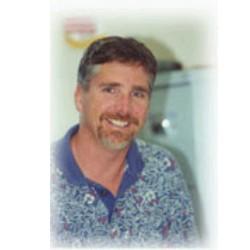The battle to stop the spread of Aussie waistlines
Published on 15 January, 2003
CQU was featured Tuesday 14/1 on the 730 Report. The 10,000 Steps physical activity project, based at CQU Rockhampton, was profiled. CQU\'s Dr Kerry Mummery of AHS\'s School of Health & Human Performance was interviewed (pictured). Below is a transcript of the ABC segment.
14/1/03; The 730 Report The battle to stop the spread of Aussie waistlines.
For a generation now, health experts have been repeating the mantra of exercise and nutrition in a bid to stop the spread of Australian waistlines. Yet rising obesity rates, and an increase in lifestyle diseases, indicate many of us have failed to take up the challenge. For the past 12 months, health researchers in the Queensland city of Rockhampton have been running a unique project designed to get residents on their feet again. It has been so successful that other communities are following suit.
GENEVIEVE HUSSEY: A few months ago, playing a long game of footy with his kids would have been almost beyond Michael Curran.
 He weighed 118 kilograms and found physical exercise an unpleasant chore.
He weighed 118 kilograms and found physical exercise an unpleasant chore.
MICHAEL CURRAN, PROJECT PARTICIPANT: When you are getting called Big Kev, you realise that you have a problem.
GENEVIEVE HUSSEY: He decided to do something about it, starting an activity program and losing 11 kilos in just four months.
He says he\'s never felt better and his family is seeing the benefits.
MICHAEL CURRAN: Before I started they used to get you to hop in the wheelbarrow and run around the house and I sort of commented dad isn\'t fitted with batteries, \'cause I\'d do a lap each and I\'d knock up but now – I\'m not up with them yet, but I hope to catch up where I can wear them out.
GENEVIEVE HUSSEY: Michael lives in Rockhampton in Central Queensland where the hot humid weather encourages many people to adopt a sedentary lifestyle, adding weight to the city\'s reputation as Australia\'s beef capital.
DR HARLEY WILSON, ROCKHAMPTON GO: 50 per cent of men and about 60 per cent of women are overweight or have physical inactivity problems.
GENEVIEVE HUSSEY: Low activity levels are a problem nationwide, and as activity drops, health problems rise, especially so-called lifestyle diseases.
DR HARLEY WILSON: The well-known ones are the high blood pressure, the high blood fats, the diabetes and the obesity syndromes.
GENEVIEVE HUSSEY: 12 months ago, a team from the school of health and human performance at Central Queensland University started a program to get people like Michael Curran back on their feet literally.
Former Canadian national swim coach, Kerry Mummery, heads the 10,000 Steps Project, which aims to encourage the members of 10,000 Rockhampton households to walk 10,000 steps every day.
10,000 steps equals about an hour and 40 minutes of walking.
What makes this program special is that participants wear a pedometer on their hip which measures every step they take.
KERRY MUMMERY, 10,000 STEPS PROJECT: If you\'re working in a desk-bound job, 3,000 to 4,000 steps is about it.
You\'ll have to go out and accumulate some more activity outside that workplace because the workplace is essentially hazardous to your health.
MICHAEL CURRAN: You might finish the day and think you did all right, but you look at the metre and you might have only done 14,000 or 9,000, and you think, oh well, it\'s not as much as I thought, so it does keep you aware of what you\'re doing.
GENEVIEVE HUSSEY: Michael Curran is just one of the program\'s success stories.
The ticking pedometer has encouraged him to work more at work and home.
MICHAEL CURRAN: I had a few mates at work when I started - I asked them would they sponsor me $1 a kilo to get them in and aware of what I was doing, and 35 of them come on board.
And subsequently I lost $11 bucks, I lost 11 kilos in 14 weeks.
GENEVIEVE HUSSEY: Dr Harley Wilson believes the program has been a success because it incorporates exercise into daily life.
DR HARLEY WILSON: They don\'t have to do it every day, walking around the park.
They can do it by just parking the car at the wrong end of the car park and walking further and incorporating it into their lifestyles and they\'re more likely to continue that for the rest of their lives.
GENEVIEVE HUSSEY: Not that long ago, program participant Sandra Baxter was typical lapsed exerciser and dieter.
SANDRA BAXTER, PROGRAM PARTICIPANT: Several times throughout my life I\'d tried to lose weight and had never been terribly successful - would lose some and then gradually put it back on again.
GENEVIEVE HUSSEY: After 10 months wearing the pedometer, she\'s lost 20 kilos and believes this time she\'ll keep it off for good.
 SANDRA BAXTER: I used to say to my husband before, \"While you\'re up will you put the video in or put the jug on\" and now I think, oh, God, I have to get up 10,000 steps and you are just aware of it, I think, and it does make you in general more active.
SANDRA BAXTER: I used to say to my husband before, \"While you\'re up will you put the video in or put the jug on\" and now I think, oh, God, I have to get up 10,000 steps and you are just aware of it, I think, and it does make you in general more active.
GENEVIEVE HUSSEY: Other participate believe in the long term the program should help save their life.
Alana Smith\'s family has a history of heart disease.
ALANA SMITH, PROJECT PARTICIPANT: I guess it\'s always at the back of my mind.
I have high cholesterol. I have it checked regularly and walking has definitely helped get that down to a better level.
GENEVIEVE HUSSEY: Now the project\'s success has inspired other towns throughout Australia to start similar schemes.
KERRY MUMMERY: We\'ve got projected now in Western Australia, Northern Territory, Tasmania, that are definitely starting 10,000 steps-type projects and also here in Queensland.
GENEVIEVE HUSSEY: The challenge is to see if the people in the program will stick with it in the long term.
Researchers will evaluate final results in October.
Health authorities believe if everyone followed a similar exercise program, there\'d be a 50 per cent drop in health care costs associated with lifestyle diseases.
KERRY MUMMERY: They are really providing themselves with an inoculation, if you will, against a lot of the lifestyle diseases.
It\'s also a great start for the other thing that I mentioned - exercise.
DR HARLEY WILSON: It would change the drift towards obesity and high blood pressure and diabetes and those things that can be prevented.
They\'re preventable diseases and they don\'t occur in a lot of other societies.
They shouldn\'t really occur in ours.
GENEVIEVE HUSSEY: Michael is on his way to his weight goal of less than 100 kilos.
He hopes Rockhampton is also on target to become the fittest city in Australia but not at the risk of losing its other title as Beef Capital.
MICHAEL CURRAN: It\'ll always be the Beef Capital, there\'s a fair bit of bull here, we all spin a bit of bull! No, it will be good, more people out there.
I\'m sure if there\'s more people running around like me, who will definitely see the benefits from it.
END

